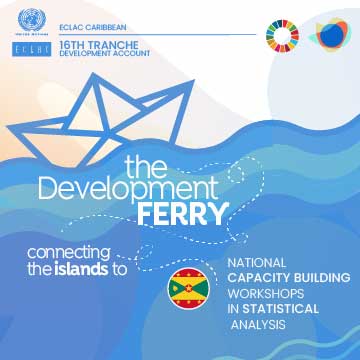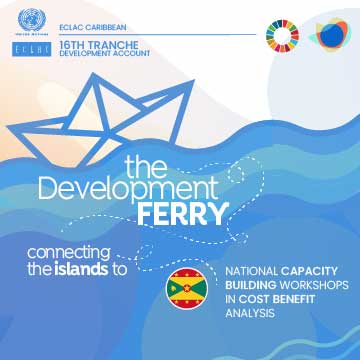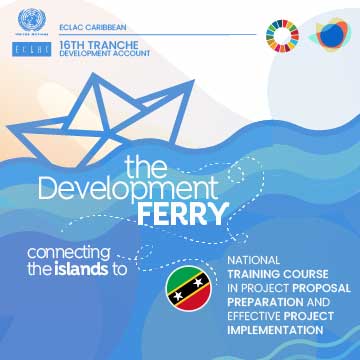National training course in project proposal preparation and effective project implementation -Antigua and Barbuda
Work area(s)
Teaser
The overall objective of the training course is to strengthen the skills level of executives, senior management, and technical staff of the Government of Antigua and Barbuda in project proposal preparation and effective project implementation. The course will enhance organizational capacity in project proposal development and implementation, ensuring effective and efficient project delivery with the ultimate purpose of improving the skills and processes of project proposal preparation and implementation within organizations, leading to higher project success rates.
Event information

Date
16 - 20 Jun 2025, 09:00 - 17:00Event type
Participation
Background
The Economic Commission for Latin America and the Caribbean (ECLAC) subregional headquarters for the Caribbean is currently implementing a Development Account (DA) project titled “Strengthened capacity to design and implement policies to enhance resilience in Caribbean SIDS.” Under the 16th tranche of the Development Account, the objective of this DA16 project is to strengthen national capacities of Caribbean countries to design and implement policies and strategies for accelerating the achievement of the Sustainable Development Goals (SDGs) and building resilient economies. Six Caribbean countries, namely, Antigua and Barbuda, Belize, Grenada, Saint Kitts and Nevis, Saint Lucia, and Suriname will benefit from the project, which is expected to enhance the technical skills of decision-makers of the target countries in the development of policies and projects to promote sustainable development and build resilience to shocks, while strengthening national institutional capacity to facilitate greater synergy in the implementation of the SDGs and the Antigua and Barbuda Agenda for Small Island Developing States (ABAS).
The midterm review of progress in the implementation of the 2030 Agenda for Sustainable Development provides a sobering account of the slow pace of achievement of the SDGs. The COVID-19 pandemic and geopolitical conflicts have negatively affected progress on SDG targets related to poverty, hunger, and climate action, while earlier gains recorded in promoting health and wellbeing, advancing quality education, and reducing inequalities are seriously threatened, if not reversed. More recently, the higher tariff regime being pursued by the new United States administration is disrupting global financial markets and has introduced new uncertainties for global trade that could constitute barriers to trade in goods and services for Caribbean SIDS. These events have severe implications for foreign exchange reserves of nations. Furthermore, global crises and their impacts exacerbate the subregion’s existing vulnerabilities, which include susceptibility to the impacts of climate change, exposure to natural hazards and disasters, increasingly unsustainable public debt, and limited technical and institutional capacity to effectively manage development challenges.
Considering the global environment in which Caribbean SIDS operate, and noting that the timeline for the 2030 Agenda is now just five years away, there is an urgency to accelerate action in implementing the SDGs. This will require strengthening national and subnational capacity, accountability, and public institutions to deliver accelerated progress towards achieving the SDGs. In its call to action for the transformation required to fully achieve the global Goals and their targets in the remaining years of the 2030 Agenda, the Global Sustainable Development Report 2023 underscores the need for capacity building at individual, institutional and network levels. Capacity development is also prominently emphasized across thematic areas in ABAS, the Outcome Document of the Fourth International Conference on SIDS (SIDS4).
Due to the human capital limitations that Caribbean countries face, there have been notable implementation gaps relating to sustainable development initiatives in sectors critical to resilience building. In contrast to its high vulnerability to the impacts of climate change and disasters, and prohibitive costs of reconstruction after a climate-induced extreme weather event or disaster, the Caribbean has received less than proportionate levels of climate finance from funding entities such as the Green Climate Fund (GCF), the Global Environment Facility (GEF), and the Adaptation Fund. The subregion is also underperforming in attracting private climate finance for resilience building. The International Monetary Fund identified an essential role for policy in attracting private sector capital toward climate investment opportunities and alluded to capacity limitation, including lack of expertise in project preparation and governments’ limited administrative capacity for project evaluation and appraisal, as major obstacles for Caribbean SIDS in attracting the much-needed capital for green investment. Therefore, capacity strengthening at institutional and individual levels is crucial for resilience building in the Caribbean.
To this end, and in fulfilment of OP1.4 of the DA16 project, ECLAC, in collaboration with the Government of Antigua and Barbuda and the United Nations Resident Coordinator’s Office for Barbados and the Eastern Caribbean, is organizing a national training course on project proposal preparation and effective project implementation in Antigua and Barbuda during 16–20 June 2025. The training course aims to strengthen national capacity to design and implement projects and reduce implementation gaps in the execution of development projects in the country.
Practical information
Expected outcome
At the conclusion of the training course, policymakers and senior government officials in Antigua and Barbuda would have gained improved knowledge of the funding cycle for development grants and be better able to provide a supportive environment for attracting these funds for financing development in the country. Similarly, technical officers in MDAs would have gained improved skills in project proposal writing and project planning, execution, and monitoring. Overall, the improved knowledge and skills gained are expected to result in increased project proposal approvals and enhanced project implementation effectiveness and efficiency.
Venue, date and language of instruction
The workshops will take place in St. John’s, Antigua and Barbuda, during 16–20 June 2025, and will be conducted in English.
Required ICT Facility for Training
Training participants are required to have a laptop with Microsoft Word and Excel, or other word processing and spreadsheet applications such as Google Docs and Sheets installed.
Related content

National capacity building workshops in statistical analysis - Grenada
The overall objective of the training is to strengthen the skills level of policymakers and technical officers of the Government of Grenada in statistical analysis which will enhance their ability…

National capacity building workshops in cost benefit analysis - Grenada
The overall objective of the training is to strengthen the skills level of policymakers and technical officers of the Government of Grenada in cost-benefit analysis which will enhance their…

National training course in project proposal preparation and effective project implementation - St Kitts and Nevis
The overall objective of the training course is to strengthen the skills level of executives, senior management, and technical staff of the Government of the Federation of Saint Kitts and…
Schedule
Schedule
16 June 2025: Workshop on project proposal preparation and effective project implementation
Morning session
Launch of DA16 project in Antigua and Barbuda
Afternoon session
- Introductions
- Ice-breakers: Mentimeter on background preparation of course participants
- Course project: Practical exercise in project proposal writing
17 June 2025: Course in project proposal preparation and effective project implementation
Morning session
- Understanding development grant makers and their funding cycles
- Identifying funding opportunities that match your needs
- Forming a winning team
Afternoon session
- The grant application process
- Responding to RFPs
- Defining and assigning tasks
- Compelling justification for grant
18 June 2025: Course in project proposal preparation and effective project implementation
Morning session
- The Theory of Change/Logical Framework
Afternoon session
- Group Exercise on the Theory of Change
19 June 2025: Course in project proposal preparation and effective project implementation
Morning session
- The grant application process
- Defining project activities, output, and outcomes
- Preparing the budget
- Submission of grant
- Responding to requests for resubmission/reformulation/changes to proposal
- Handling rejection
Afternoon session
- Implementing a funded project
- Hiring the right complement of skills
- Implementing a dynamic workplan
- Managing project budget
20 June 2025: Course in project proposal preparation and effective project implementation
Morning session
- Monitoring and Evaluation of funded projects
- Purpose and tools of M&E
- Performing M&E
- Preparation of project reports
Afternoon session
- Group exercise on M&E
- Course evaluation
Attachment(s)
Related link(s)
Organizing institution
ECLAC Subregional Headquarters for the Caribbean
- http://www.cepal.org/en/headquarters-and-offices/eclac-caribbean
- (868)224-8000
Contact
Aurélie Quiatol
- aurelie.quiatol@eclac.org
- (868) 224-8071